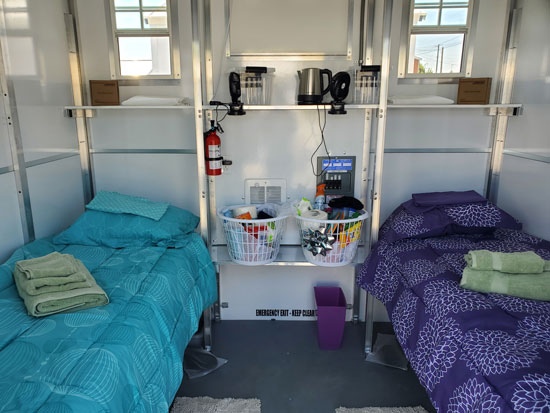The village located behind the Everett Gospel Mission includes 20 shelters for people experiencing homelessness.
Ian Davis-Leonard
EVERETT — Move-in week has begun at a much-debated shelter village for people experiencing homelessness near downtown Everett.
On Tuesday, the first few residents relocated to new 64-square-foot units designed by the Everett-based manufacturer Pallet. Over the next few days, as many as 30 people will make the once-vacant lot in the 3700 block of Smith Avenue behind the Everett Gospel Mission their temporary home.
Flower pots and welcome mats accompany each of the 20 shelters. Inside, a gift basket and clean sheets on twin-sized beds await the new occupants.
The low-barrier, standalone spaces are designed as an alternative for people who have found traditional shelter incompatible with their lifestyle as they work to transition from the streets to more permanent housing.
The Pallet shelters operated by the Everett Gospel Mission permit pets and offer a safe place for a person to keep their things. There are five units for couples. The shelters remove a few of the obstacles that may have kept people from seeking help.
“Everyone knows that you need four walls around you,” Mayor Cassie Franklin said during a tour of the site last week. “The only way you can get safe and recover from the traumas of life on the street is to get inside and get that little bit of stability.”
The Pallet shelter’s debut also triggered an eviction process for the few remaining people living under tarps and in tents in the Smith Avenue corridor. A “no-sit, no-lie” ordinance prohibiting sitting or lying on the streets and sidewalks in the 10-block area east of Broadway between 41st Street and Pacific Avenue can be enforced now that the Pallet shelter site is open.
Everett Police Chief Dan Templeman said implementation of the law won’t be immediate. The ordinance stipulates that people can’t be cited unless they continue to violate the rule after being notified by law enforcement.
“We are going to continue our same philosophy, which is outreach first, education, inform people and then we’ve got another tool with this ordinance to enforce. That is going to be a last resort,” Templeman said. “The goal will be — whether it be a month or beyond — that at some point in the future, you won’t see that (homeless individuals in this area) or it will be at a minimum, and if it pops up, we are able
to address it fairly quickly.”
The department’s Community Outreach and Enforcement Team of four officers and three social workers were tasked with filling the Pallet village. The list of hopeful residents last week had more than 60 names, including 17 couples.
Once moved in, residents will have access to amenities from the Mission including showers, laundry machines and meals.
Sylvia Anderson, CEO of the Everett Gospel Mission, said a pair of mental health case managers and a 24-hour security service will accompany the new facility. No timeline will be immediately imposed on a person’s stay at the shelter. Instead, she said, the focus will be on building relationships.
“The challenge is: a lot of the folks that are coming in don’t trust and rightfully so, because they’ve been promised a lot of things that don’t happen,” Anderson said. “We are not going to demand you meet with a case manager right away. We are going to earn the right to be in your life.”
Grants totaling more than $1 million from the state and county paid to construct the project. Along with the money comes a stipulation that a person cannot be rejected from the housing solely because they abuse drugs or alcohol, resist human services or have a criminal record.
“It is a harm reduction model,” Anderson said. “Not a bunch of rules that say ‘You can’t, you can’t, you can’t,’ but about community behavior and how you impact the community as we work on your individual issues.”
As the “no-sit, no-lie” ordinance becomes law, so too does a prohibition on providing food, goods, supplies or services within the boundary without a permit from the city.
Julie Willie, Everett’s community development director, said groups looking to deliver assistance can begin applying for a permit through the public works department this week. However, she said, the city would prefer that groups collaborate with the Mission to serve the homeless population.
“We really wish that those that want to do street outreach don’t do it, because it really is beginning to enable our population to just be really comfortable on the streets.” Willie said. The people experiencing homelessness “aren’t interested in services, because they get their basic needs brought to them where they are at.”
The first year of the Pallet project will determine the shelter’s long-term viability, Willie said. If deemed beneficial, it is possible the site on Smith Avenue could expand, but how progress will be evaluated is still under discussion.
“Some people want success for people to get clean and sober, that is not our measure of success,” Willie said. “We want to see less people on our sidewalks, we want to have less violence in this neighborhood, we want to have less defecation on people’s
doorsteps. Success for the city of Everett is different, perhaps, than what success is for the Gospel Mission.”

 Ian Davis-Leonard photo
Ian Davis-Leonard photo